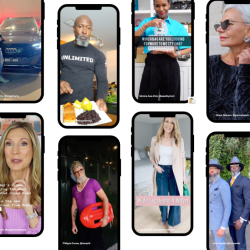They were the pioneers of video games, MTV, grunge and post-punk…
They lived through the end of the Cold War and the triumph of capitalism, the demise of apartheid and the defeat of the organised working class. They were known as the ‘latchkey’ kids as ‘free-range’ parenting and soaring divorce rates meant they came back from school to empty homes. And they are just about to inherit trillions from their baby boomer parents.
I’m talking about Generation X of course. These ageing rockers were born between 1965 and 1980, and today are at the peak of their influence, occupying many of the top jobs in industry, hitting the height of their earnings potential and taking big decisions that impact us all. Found by Experian to be the biggest spenders in the UK in 2018, Gen X were also the biggest earners and highest contributors of tax, despite being a smaller cohort than millennials (there are 13.7m Gen X’ers in the UK today, compared to 14.1m millennials). And yet marketers and brand managers often appear obsessed with the youthful Gen Z, and are increasingly turning their eyes towards the kids of Gen Alpha. They’ve been sweating over millennials for at least a decade, in the search for marketing alchemy, trying to blend purpose with authenticity. But Gen X are deemed past it, a no-go area of little interest. Gen X risks ending up as the ‘forgotten’ generation, sandwiched between wealthy boomers and socially conscious millennials, with some saying they lack ‘cultural impact’ to be made the target audience for brand design.
But advertisers ignore them at their peril. Gen X have strong spending power and tend to live in larger households with older children — as a result, they are the generation that spend the most on their weekly grocery shopping. They are big spenders on travel and holidays (second only to the boomers with all their accumulated wealth and free time) and are the generation most likely to own two cars, spend the most on fuel to drive their car (and heat their homes). Some of this generation still have their parents around, and are influential in decisions around their spending. Meanwhile, others are grandparents and therefore influential in the purchasing decisions of their children. Perhaps this sandwich status, with generations both above and below them, explains why Gen X’ers are the ones spending the most at Christmas time —with almost 23% of them spending £500 or more on gifts.
But not only do they have money and the need (or desire) to spend it — Gen X also has more cultural capital than you might think. While Gen Z might dominate social media content, it’s Gen X who are at the top of the tree in business, the media, as well as art, film, fashion, and music.
Witness the current revival of the ’90s, which is permeating not just fashion (Levi’s relaunching baggy jeans) but also interior design, street art and cinema —with remakes of The Matrix in the offing, while the iconic movie Clueless makes the transition to Broadway. And not to forget the drama and controversy that surrounded the announcement of Oasis’ reunion and the subsequent ticket madness. With the recent news that Hasbro is bringing back the legendary Furby toys, the era when Gen X came of age is becoming part of the culture for new generations.
So if we’re all agreed that Gen X is an important audience for marketers, do we need to change the way we communicate with them in order to connect?
Marketers of course should always be mindful of lazy generational thinking — and Gen X’ers are a diverse group who just happen to share a similar age and life stage. They are as divided as any cohort on politics, music, religion and sport. But what they do share (thanks to their age), is a unique media profile — they grew up in the analogue age and then took the huge step into the digital era and this transition shows in the way they approach and consume media, choose and buy brands, and who and what influences them.
Gen X are still a TV generation, having been brought up in the age before multichannel stations or global streaming services, and so brands like the BBC, ITV and Channel 4 still hold sway with them. As such, commercial linear TV still reaches 93% of Gen X each month — well up on the 80% mark for under 45s. And the time spent in front of the box is still very strong — they are watching around 2h 40m of live TV a day, considerably more than younger generations — though still less than the boomers of course.
However, unlike the boomers, they have really embraced on-demand viewing, with video streaming accounting for 1h 14m of daily viewing time. But reflective of their old pre-digital media allegiances, Gen X’ers are the most likely generation of all to be found on the broadcaster VOD platforms such as ITVx, Channel 4 Streaming and Sky. And perhaps reflective of their high regular spending, they are the most likely generation to regularly use Amazon Prime Video.
Social media, of course, is second for this generation in terms of both weekly reach, and time spent on media — and as you might expect it’s more likely to be Facebook than anything else. But don’t ignore Instagram for Gen X — 45% of them are on the ‘gram, while YouTube reaches 58% of them each month. And it’s not just ‘how to’ videos about DIY and cooking that they are into — you might be surprised to learn that over a fifth of Gen X’ers have watched a livestream on Youtube in the last 90 days — which is a fraction more than those who have used TikTok.
When it comes to the news, the traditional sources hold sway — even if the medium has changed from analogue to digital. Gen X trusts traditional news outlets, from TV and radio to news brands — but rather than buying a newspaper, they get their news online, mainly from the newspaper’s website or app. There’s a visible gap between Gen X and millennials in treating social media as the main source of news, with just 10% of Gen X relying on social media compared to 25% of millennials — again, that ‘coming of age’ in an analogue world still influencing media consumption patterns.
This same trend is visible in audio listening too — while podcasts have grown across the generations, there’s a clear gap in broadcast radio listening. The Gen Xers — with their working routines and old media allegiances — are the biggest demographic in the traditional radio peak times of breakfast and afternoon drive time, and while podcasts are approaching 60% monthly reach in the UK for this generation, they are more likely to be fans of BBC Sounds, whereas Spotify reigns in the podcast world for millennials and Gen Z. Of course, reaching Gen X is one thing, but actually connecting with them is the other part of the puzzle for marketers.
Despite — or perhaps because of — their life experience, Gen Xers tend to be a little more forgiving of advertising’s existence, since they perhaps understand and appreciate that the ads fund the free content they consume — they are the generation least likely to see ads as a waste of time, and least likely to feel bombarded by ads, compared to other generations, and also least likely to claim they don’t trust ads.
And yet brands are tending to ignore this generation, both in media targeting and creative work — with only 24% of ads featuring people over 50, leading to a low rate of feeling ‘seen’. Gen Xers prefer ads using real-world situations and authenticity rather than the high energy and extreme situations preferred by millennials but many marketers are ignoring this, or unaware of it.
And so, brands should grasp the opportunity and forge a bond with the forgotten generation. Gen Xers want to be seen in advertising and will respond if they are shown in a positive light. Brands’ obsession with targeting the younger generations is costing marketers sales.
And with Gen X also set to inherit wealth from boomers over the next 20 years, to become the richest generation ever. There is a rich seam of opportunity here, for brands to target this sidelined demographic. Can you really afford to forget that X marks the spot?
Sources for any data points not otherwise credited: YouGov Profiles, GWI, IPA Touchpoints, BARB/Techedge
Featured image: Kindel Media / Pexels
































